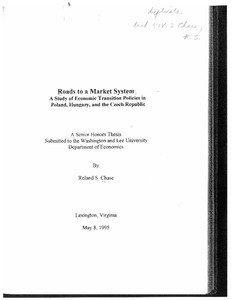| dc.rights.license | In Copyright | en_US |
| dc.creator | Chase, Roland Sydney | |
| dc.date.accessioned | 2023-10-20T15:49:19Z | |
| dc.date.available | 2023-10-20T15:49:19Z | |
| dc.date.created | 1995 | |
| dc.identifier | WLURG038_Chase_thesis_1995 | |
| dc.identifier.uri | https://dspace.wlu.edu/handle/11021/36251 | |
| dc.description.abstract | After summarizing the economic progress in Poland, Hungary, and the Czech Republic between 1989 and 1994, I will conclude the thesis by returning to the two points emphasized in the
introduction: First, in several instances the governments in Central Europe failed to intervene in the economy when doing so might have alleviated transformation. Second, the relatively fragile political environment in Central Europe often prompted the governments to replace policies that would have been economically beneficial in the long run with policies that received more popular support. Although excessive state intervention is undesirable in a market system, during economic transformations such as in Central Europe, the government should exercise close supervision over certain sectors of the economy. At the root of the unsuccessful financial reforms in Poland, Hungary, and the Czech Republic, lay the governments' failure to exert pressure on state-owned banks to change their lending policies and on defaulting enterprises to implement cost-cutting programs and establish efficient bankruptcy procedures. . . . The second point emphasized in the introduction regarded the Central European governments' tendency to replace economically beneficial policies with those receiving more popular support. As in all democratic countries, the desire to win the next election drives many politicians' actions in Prague, Warsaw, and Budapest. In the election campaigns of the late eighties, candidates for the
nations' leadership positions attempted to convince the public that their policies would ensure a minimally painful transformation. When it later became obvious that economic transition would not be as smooth as envisioned, the governments often delayed certain reforms that would have curtailed the nations' welfare even further in the short run. However, a delay in enacting these reforms possibly postponed the economic recovery and thus the achievement of a higher state of social welfare in the long run. . . . The previous assertion returns us to our first observation about the changes in Central Europe: Popular expectations, influenced to a large extent by government officials, were too optimistic in 1989. It remains difficult to ascertain to what extent the leaders of Central Europe had anticipated the upcoming trials of transition. Had the governments known the true extent of the challenges awaiting them, they could have warned their countries that only with the combined effort and determination of all citizens could the transition be mastered quickly. It is uncertain whether the Central Europeans would have actually understood the warnings, given the low levels of public knowledge about economics. However, with a more determined and prepared electorate backing them, Central Europe's leaders might not have hesitated to enact above reforms detrimental to national welfare in the short run. Knowing that these reforms could shorten the economic transition, the people of Poland, Hungary, and the Czech Republic, might have been more supportive of them. [From Conclusion] | en_US |
| dc.format.extent | 100 pages | en_US |
| dc.language.iso | en_US | en_US |
| dc.rights | This material is made available for use in research, teaching, and private study, pursuant to U.S. Copyright law. The user assumes full responsibility for any use of the materials, including but not limited to, infringement of copyright and publication rights of reproduced materials. Any materials used should be fully credited with the source. | en_US |
| dc.rights.uri | http://rightsstatements.org/vocab/InC/1.0/ | en_US |
| dc.subject.other | Washington and Lee University -- Honors in Economics | en_US |
| dc.title | Roads to a Market System: A Study of Economic Transition Policies in Poland, Hungary, and the Czech Republic | en_US |
| dc.type | Text | en_US |
| dcterms.isPartOf | WLURG038 - Student Papers | en_US |
| dc.rights.holder | Chase, Roland Sydney | en_US |
| dc.subject.fast | Economic policy -- Czech Republic | en_US |
| dc.subject.fast | Economic policy -- Hungary | en_US |
| dc.subject.fast | Economic policy -- Poland | en_US |
| local.department | Economics | en_US |
